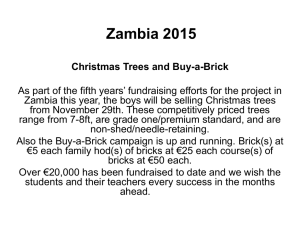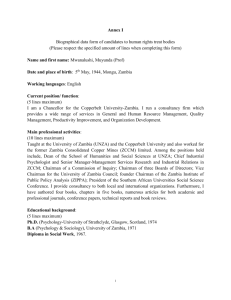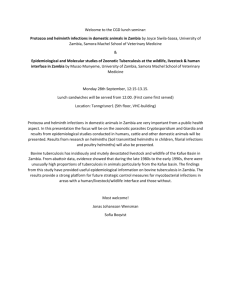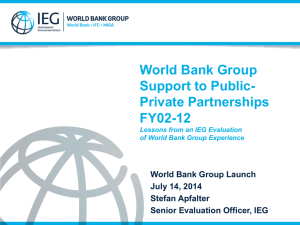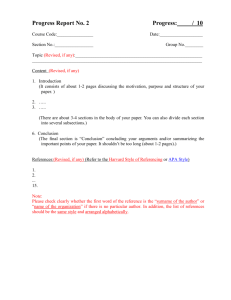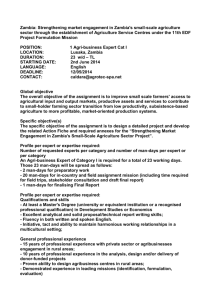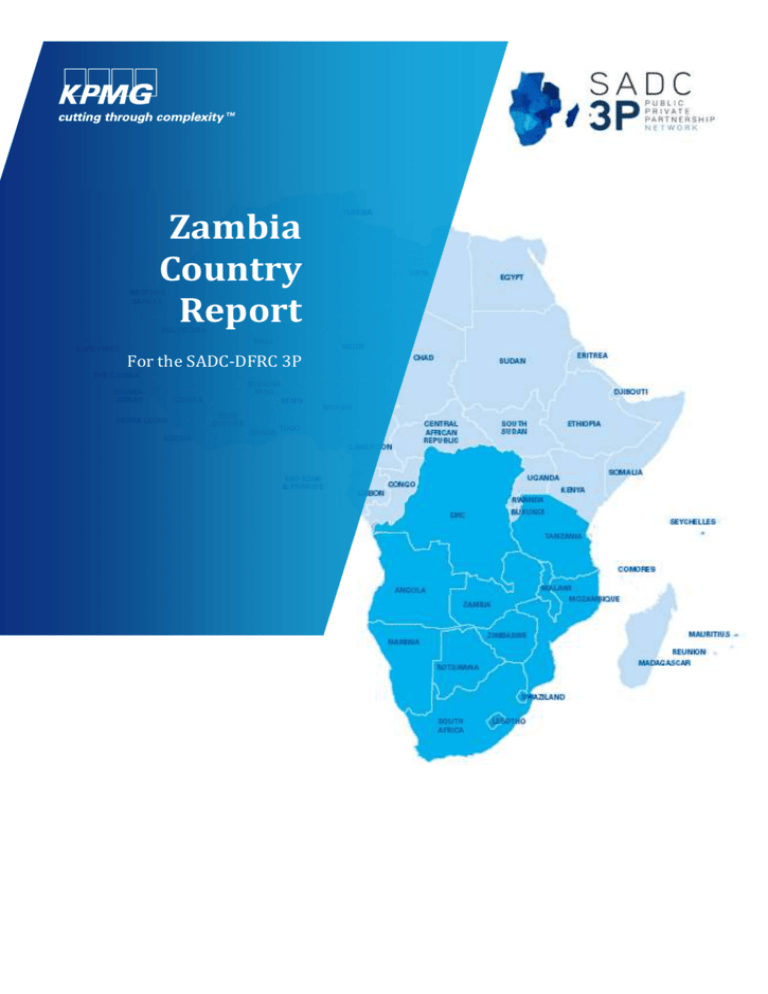
Zambia
Country
Report
For the SADC-DFRC 3P
Contents
1
Overall evaluation of Zambia’s readiness for PPPs
1
1.1
Background
1
1.2
Attractiveness of the member countries
1
1.3
Availability of domestic capital and debt funding
2
1.4
Judicial system
2
1.5
Governance and decision making
3
1.6
Ease of doing business in the member country
3
1.7
PPP environment in the member country
4
1.8
Observations
5
1.9
Conclusion
5
Zambia
1
Overall evaluation of Zambia’s readiness
for PPPs
1.1
Background
We evaluated the Member Country by looking at 6 broad categories, containing a number of subcategories. The six (‘6’) broad categories include:
■
■
■
■
■
■
Attractiveness of the member countries
Availability of domestic capital and debt funding
Judicial system
Governance and decision making
Ease of doing business in the member country
PPP environment in the member country
The information and indicators were obtained from external sources like World Bank, World Economic
Forum, IFC, Ibrahim Index of African Governance, KPMG country reports and actual visits to the member
countries (with exception to three (‘3’) countries, namely , Democratic Republic of Congo, Swaziland and
Seychelles). Where possible, KPMG utilised its in-country office to address the categories and answer
questions surrounding the projects.
On the country visit we met with Zambia’s PPP unit (Director Dr Stephen Gumboh on 21 June and 11
July), one bank (Stanbic 21 June) and the KPMG local office representatives (ongoing).
Each sub-category was rated either one (‘1’), two (‘2’), three (‘3’) or four (‘4’) based on the indicators
from various reputable sources. Where one (‘1’) and two (‘2’) refers to “Developing towards PPP
readiness” and three (‘3’) and four (‘4’) indicates a “Maturing level of PPP readiness”. Where no
information was available, no value was given. Where there was an element of subjectivity, KPMG, based
on years of experience, applied its own mind in coming up with a value. The overall broad category value
is addressed in more detail below.
1.2
Attractiveness of the member countries
Attractiveness
member country
of
the
Source of information
Information
GDP % growth for last 3 years
World Bank
Actual GDP in numbers (size of
economy), current USD$
World Bank
Lending Interest rates
World Bank
Inflation rate
www.trading economics.com/countrylist/inflation-rate
7.00%
Moodies, S&P, Fitch on
http://www.tradingeconomics.com/za
mbia/rating
B1
Credit Rating
6.50%
19,206,044,932
18.8
1
Zambia
Political Stable and Absence of
Violence
Governance indicator, World bank
61.8
Macro-Economic Environment
The Global Competitiveness Report
2012-2013, World Economic Forum
4.65
Attractiveness of Zambia, overall result is a three (‘3’)
Zambia has a GDP of USd19,206 million and has sustained close to 7% year on year growth over the last
three years on the back of much improved political stability and macro-economic climate. The GDP per
capita remains low at USD1,600 and the sovereign credit rating is sub-investment grade at B+ (S&P). This
analysis results in an overall value of three (‘3’), Zambia is thus considered “maturing” in terms of this
category
1.3
Availability of domestic capital and debt funding
Availability of domestic capital and debt
funding
Information
Source of information
Number of banks
19
Country visit
Number of equity investment funds
Only micro funds
Country visit
Number of pension funds
50+ company schemes
Country visit
3 year history of bond issuance
Very successful $750m bond
issue in 2012
Country visit
Assessment of available capital (local) for
investment
Minimal/no local funds for
capital investment, small
amounts
for
working
capital/minimal
equity
investment
Country visit
Availability of domestic capital and debt funding in Zambia, overall result is a three (‘3’)
Zambia has a limited domestic debt market and although there are some 19 banks in the country they
have limited ability to make the substantial and long term loans necessary for infrastructure. The equity
market is small and fragmented and although there are a number of institutional investors (primarily
pension funds) the local equity investments are also likely to be very limited. This analysis results in an
overall value of three (‘3’), Zambia is thus considered “maturing” in terms of this category
1.4
Judicial system
2
Zambia
Judicial system that contributes to effective
commercial dispute resolution
Information
Source of information
Enforcing Contracts (country ranking from 1 to
185)
89
Doing Business 2013 – The
World Bank and IFC
Rule of Law (rating from 1 to 100)
39.4
Governance indicator, World
bank
We used the key indicator ‘Enforcing Contracts’ from Doing Business as they focuses on how public
institutions function in the case of a commercial dispute1. Doing Business measures the time, cost and
procedural complexity of resolving a commercial lawsuit.
Judicial system of Zambia, overall result is a two (‘2’)
Zambia ranks 89th in enforceability of contracts and scored 39.4 out of 100 in application of the Rule of
Law. This analysis results in an overall value of two (‘2’), Zambia is thus considered “developing” in terms
of this category
1.5
Governance and decision making
Governance
and
decision
making in member country
Information
Source of information
Institutions
4.09
Africa’s Governance
59
The Global Competitiveness Report 2012-2013,
World Economic Forum
Ibrahim Index of African Governance
Voice and accountability
42.3
Governance indicator
Government effectiveness
29.9
Governance indicator
Regulatory Quality
36.5
Governance indicator
37
Governance indicator
Control of Corruption
Governance and decision making of Zambia, overall result is a two (‘2’)
Zambia was given a rating of 58 out of 100 for governance by the Ibrahim Index of African Governance
and a government effectiveness rating of 29.9. This analysis results in an overall value of two (‘2’), Zambia
is thus considered “developing” in terms of this category
1.6
Ease of doing business in the member country
Ease of doing business in the member country
1
134
Source of information
Doing Business 2013, the World Bank and IFC
3
Zambia
Starting a business
74
Doing Business 2013 – The World
Bank and IFC
151
Doing Business 2013 – The World
Bank and IFC
151
Doing Business 2013 – The World
Bank and IFC
96
Doing Business 2013 – The World
Bank and IFC
12
Doing Business 2013 – The World
Bank and IFC
82
Doing Business 2013 – The World
Bank and IFC
47
Doing Business 2013 – The World
Bank and IFC
156
Doing Business 2013 – The World
Bank and IFC
99
Doing Business 2013 – The World
Bank and IFC
Dealing with Construction permits
Getting electricity
Register property
Getting credit
Protecting investors
Paying taxes
Trading across borders
Resolving insolvency
Ease of doing business in Zambia, overall score is a two (‘2’)
Zambia is 74th out of 185 countries in the world in terms of ease with which to start a business and is
ranked 82nd for protecting investors. It is 12th in terms of access to credit and 151st for the ease of dealing
with construction permits.
This analysis results in an overall value of two (‘2’), Zambia is thus considered “developing” in terms of
this category
1.7
PPP environment in the member country
Enabling environment in the member country
for PPPs
Source
information
Legal system enabling PPPs in the member country
Country visit
-
Is there a presence/development of
enabling legislation ie PPP Law/
regulations etc?
-
Does a policy for private participation in
the member country exist?
There is a PPP Act (2009) and Policy.
Also an Operational /Procurement
Manual was drafted but needs
updated.
Yes see above.
Public Sector appetite/capacity and experience
relating to PPPs in the member country
-
Is there Political support for PPPs?
-
Is there a PPP focal point/ Unit in the
member country?
of
Country visit
Country visit
Country visit
The previous administration was
supportive, the impression is the
current one is less so.
There has been a PPP Unit for some
years, under the MoF, though there
are plans to move it to the Zambia
Development Agency. Most Ministries
in theory have a contact point too.
Country visit
Country visit
4
Zambia
-
Does an existing PPP track record in the
member country exist?
A number of PPP projects (definition
in a broad sense, and building on the
privatisation programme in the 90’s)
were launched but all have been
cancelled. eg. The concession of the
national railways. Lessons learnt
including poor structuring and then
administration of contract
performance.
Private sector capacity, capability and appetite
Country visit
Country visit
-
Are multiple firms active in the PPP
market?
Considerable interest to tenders, but
dominated by international firms
Country visit
-
Does capacity exist in the private sector?
Very little, local firms will support
international ones when bidding.
Country visit
PPP environment in the Zambia, overall score is a three (‘3’)
There is a PPP Act (2009) and a PPP Unit within the Mistry of Finance, although this may be relocated to
the Zambia Development Agency. The history of PPP-type projects implemented to date is not good with
a number of cancelled contracts including the Zambian national rail concession. This analysis results in
an overall value of three (‘3’), Zambia is thus considered “maturing” in terms of this category
1.8
Observations
Our results are based on the most recent verifiable information available at time of the report
Reputable external sources were used where appropriate and fact based observations were made.
Representative of the member countries PPP units did not recognised the projects identified in the
RIDMP and STAP
1.9
Conclusion
The macro-environment for PPP’s in Zambia is very positive with many of the fundamentals in place, for
example a stable political environment and broad regulatory and legal environment, the necessary
specific PPP laws and policy, and a pipeline of projects. Furthermore there have been many years of
effort and capacity building both in the central PPP unit (a good number of certified PPP practitioners),
but also in the individual ministries, many of which have a PPP contact or desk which is meant to link to
the PPP unit in the delivery of the projects.
The impression is that the current political administration does not place the PPP model as their top
priority as they seek to deliver a raft of infrastructure projects and programmes. The impression is that
some of the positive aspects of the PPP model are not very well understood at the political level, and there
are some negative perceptions eg. Complexity of deals, loss of control to the private sector, and long and
expensive procurement processes. However the PPP model is seen to have a place and projects have been
identified.
Overall Zambia is thus considered “maturing” in terms of this assessment.
5
© 2013 KPMG Services (Pty) Ltd, a South African company and a member firm of the KPMG
network of independent member firms affiliated with KPMG International Cooperative (“KPMG
International”), a Swiss entity. All rights reserved.
The information contained herein is of a general nature and is not intended to address the
circumstances of any particular individual or entity. Although we endeavour to provide
accurate and timely information, there can be no guarantee that such information is accurate as
of the date it is received or that it will continue to be accurate in the future. No one should act
on such information without appropriate professional advice after a thorough examination of
the particular situation.
The KPMG name, logo and “cutting through complexity” are registered trademarks or
trademarks of KPMG International.

